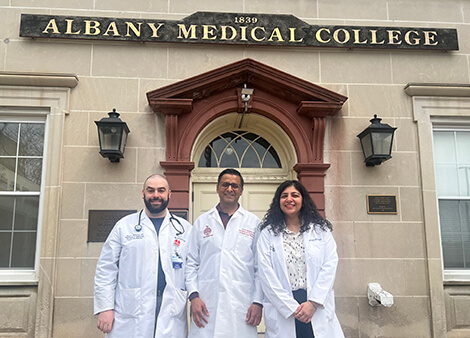Nephrology/Critical Care Medicine Fellowship

The Nephrology/Critical Care Medicine program is a combined fellowship training track developed in close collaboration between the Divisions of Nephrology and Pulmonary/Critical Care Medicine at Albany Medical Center. We offer up to two training positions each year for this innovative program, aimed at recruiting highly qualified and motivated applicants who seek formal training and ABIM certification in both nephrology and critical care medicine.
This combined program spans three years of training. The first two years are highly focused on inpatient and outpatient nephrology training, with the third year exclusively dedicated to critical care medicine. By the end of the second year, the fellow is board-eligible for nephrology, and by the end of the third year, for critical care medicine.
Training Sites
- Albany Medical Center: The only tertiary care center in New York's Capital Region, Albany Medical Center has 766 beds, including more than 100 ICU beds in medical, cardiac, surgical, neuro, vascular, and cardiothoracic units. The adult Emergency Department sees more than 80,000 visits per year. Albany Medical Center, the anchor of the Albany Med Health System, serves a population of approximately three million people in northeastern New York, southern Vermont, and western Massachusetts, and is the major referral center in the area. This strategic position, combined with the complexity of the patients cared for, ensures vast exposure to major areas of nephrology, including ICU nephrology, acute renal replacement therapy (CRRT and iHD, sometimes simultaneously with ECMO), CKD and ESRD care, resistant hypertension, electrolyte disorders, and a strong glomerular and vasculitic disorder population.
- Albany Stratton VA Medical Center: A 117-bed hospital, including 10 ICU beds, that sees approximately 50,000 patients each year at the main medical center and in community-based clinics.
- Outpatient Dialysis Units: Our nephrologists care for approximately 200 patients with end stage renal disease and approximately 50 home dialysis patients (PD and home HD).
Program Structure and Curriculum
First Year of Training
The first year of training consists of 12 months of inpatient and outpatient nephrology training. A medical ICU elective option is available for the interested fellow. The curriculum is shared with fellows in the clinical nephrology track, including rotations at Albany Medical Center, Albany Stratton VA Medical Center, and the outpatient dialysis units. For further details please see the Curriculum page.
Second Year of Training
Second year fellows on this combined track will still train predominantly in nephrology, but they will start integrating exposure to critical care medicine. This is achieved through attendance and participation in critical care medicine conferences throughout the academic year, along with medical ICU rotations (scheduled for minimum of 4 weeks). Additional experience includes participation in a critical care medicine “boot camp” in the summer months.
Fellows are encouraged to take the ABIM Nephrology boards by the end of this year. This will ensure a board passing rate of 100 percent.
Third Year of Training
The third year is completely dedicated to critical care training. During these twelve months, the fellow will be an integral part of the critical care team at Albany Medical Center, which has more than 100 ICU beds. This setting ensures critical care exposure in ICUs dedicated to a range of specialties, including medical, surgical, neuro, vascular, cardiac, and cardiothoracic care.
During this time, the fellow will train with a myriad of specialties including critical care/pulmonary medicine, surgical critical care, neurology and neurosurgery critical care, cardiothoracic surgery, and anesthesiology. In addition, fellows provide critical care consultation to all patients admitted to the hospital including the Emergency Department. Our system includes 24/7 fellow coverage with a dedicated night float system, ensuring a good balance of supervision and autonomy for the trainee.
State-of-the-Art Training
State-of-the-art training is provided to our fellows, including all aspects of critical care medicine. Trainees will achieve competency in various procedures including endotracheal intubation, bronchoscopy, thoracentesis, chest tube placement, central line insertion (including hemodialysis catheters), arterial line placement, ventilator management, paracentesis, lumbar puncture, ECMO, and Swan-Ganz catheter placement. Our program includes an advanced ultrasound curriculum aiming to achieve competency in bedside echocardiography in addition to point-of-care ultrasound. All our prior fellows have passed the NBE board exam for echocardiography (ASCeXAM).
In addition to clinical training and exposure, our program emphasizes formal fellow education. Multiple conferences and teaching sessions are scheduled during each week, including advanced ultrasound/echocardiography conference, case conference, journal club, didactic conference, morbidity and mortality conference, and board review sessions. Fellows are encouraged to participate actively in the international CHEST and SCCM conference during their training year.
Call System
The call system for the critical care medicine fellow includes a night float rotation, eight 24-hour calls while in the MICU, and a total of six to eight weekend calls per year. A breakdown of the rotations is shown below.
| ROTATION | DURATION |
|---|---|
| Medical Intensive Care Unit | 8 weeks |
| Critical Care Consults | 8 weeks |
| Cardiothoracic Intensive Care Unit | 2 weeks |
| Neuro Intensive Care Unit | 2 weeks |
| Surgical Intensive Care Unit | 2 weeks |
| Elective/Research Time | 10 weeks |
| Research | 4 weeks |
| Night Float | 8 weeks |
| Vacation/Conference Time | 4 weeks |